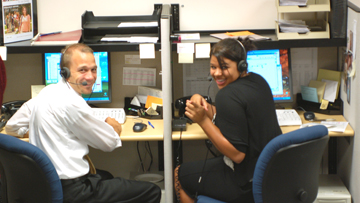You have free articles remaining this month.
Subscribe to the RP Witness for full access to new articles and the complete archives.
The senior year of high school is supposed to be unforgettable—the carefree capstone to 13 years of education. But it often turns into the most stressful 9 months yet for students who, on top of homework, sports, clubs, church, families, and part–time jobs, are busy visiting and applying to colleges.
Geneva College’s admissions staff recognizes this and attempts to reward high school students with something that many of its counterparts and competition can’t or simply don’t offer—personal attention.
Take, for example, this excerpt from an email sent by a prospective student to his admissions counselor regarding his experience with Geneva:
I visited your school this past Friday and just wanted to let you know how much I enjoyed it. The way the morning was planned out was perfect for me. Thank you for taking the time to sit down and talk with me after my tour. I received your letter just yesterday and wanted to let you know how much I appreciate the personal attention. I have not visited any other college that has paid as much attention to prospective students as Geneva.
This type of response has become something of a norm for Geneva’s admissions office. Heartfelt messages come in from parents and students expressing their appreciation for everything from warm receptions to informative tours and interviews to special accommodations and arrangements for their family’s individual needs.
It’s this kind of feedback that makes a job in Geneva’s admissions office worthwhile. And there are plenty of people who know. Geneva employs 9 full-time senior and 18 part-time student admissions counselors, making it distinct from its fellow Christian schools.
“We wouldn’t need so many counselors if we didn’t work the way we do,” says Joe Oliver, who is in his third year of full–time admissions counseling. “The more counselors we have, the more we’re able to divide up travel and workload so that we can each concentrate on a smaller number of people.”
So when potential students call Geneva, there are 27 counselors, 13 tour guides, and numerous bed & breakfast hosts available to do what it takes to make sure those students are well informed, well prepared and welcomed as if they are already a part of the Geneva community. Visiting families often sit in on classes, have financial-aid assessments, and meet with professors and coaches. They attend chapel, meals, and sporting events; potential athletes watch practice or stand on the sidelines with the teams for games; students spend the night in the residence halls or apartments on campus through Geneva’s bed & breakfast hosting program.
Like any institution, Geneva considers numbers and figures each year as it reviews the year behind and prepares for the year ahead. As numbers go, it has been a banner year for enrollment services. But Geneva looks past the numbers to minister to the students themselves. As soon as high school students express interest in Geneva, they are assigned to admissions teams comprised of one senior and two student counselors. Every student is contacted personally by phone or email. After that first contact, counselors call their students on a regular basis to hear about their athletic seasons, test dates, play performances, student council campaigns, debate competitions, youth group activities, part-time jobs, and other pursuits.
Sophomore music major Valerie Swigart (Indianapolis, Ind.)—one of 18 students working as student admissions counselors this year—decided on Geneva initially because of its connection to the Reformed Presbyterian denomination. But her positive over-the-phone experience with a Geneva recruiter enhanced her desire to enroll.
“My admissions counselor was always friendly and caring and personal—and truly seemed concerned about me as an individual and not just another potential number to increase the student population,” Swigart recalls. “This just confirmed to me that Geneva is a small campus community where every student gets individual attention, and I really wanted that in the school where I was going to go.”
Relationships are built as throughout the year counselors send information, emails and personal notes to their students, prodding them through the various stages of the application process and reminding them of their importance to the college. When students make a deposit, Geneva asks that they attach their senior picture so their counselors know them by name when they walk in the door. The relationships sometimes include students informing their counselors of needs and difficult situations in their lives for which they would like prayer, and these specific requests are acknowledged in staff prayer meetings.
All this personal attention naturally results in longer hours and busier schedules for counselors. Other admissions offices that function in a more systematic manner may question what difference all this extra work is making.
Class of 2007 Geneva graduate Emily Stains can tell them. As a high school senior, Stains applied for early admission to the college she’d known for years she wanted to attend. Or so she thought. When she was denied early admission and put on the waiting list, her parents encouraged her to apply elsewhere, “just in case.”
“The next day I got a mailing from Geneva talking about an open house,” she recalls, “and I started thinking about what I really wanted in a college.”
Stains, who had already been accepted to several large state universities, decided to apply to Geneva. A week later her admissions counselor Brooke Witterman called to congratulate her on her acceptance. Surprised and pleased by such a personal and timely response, Stains made an appointment to visit.
“I got out of the car to go to the admissions office, and I instantly fell in love with [Geneva]. I told my parents, ‘We can get back in the car and turn around right now,’ because I had such a peace there.”
Stains’s parents insisted they had not driven over two hours to get right back in the car, and they proceeded with their campus tour, which further confirmed that sense of peace.
“Everyone was saying ‘hi’ to everyone and saying ‘hi’ to me, something that didn’t happen on other college tours,” Stains remembers. “I met with Brooke and she was so amazing. She really encouraged me [to pursue] what I wanted and told me what I could find at Geneva. I put down my deposit right then and there. I felt so confident about my decision I never thought twice about it. Even after I got to Geneva I never doubted that was where I was supposed to be.” When as a sophomore Stains learned about the student admissions counselor positions, she leapt at the chance.
“The admissions team was so crucial to my coming to Geneva,” says Stains. “I mean, Brooke called me every week, and I feel like she took a genuine interest in getting to know me as a person. By far one of my best experiences at Geneva was getting to be an admissions counselor like Brooke was to me.”
There are countless stories, much like this one, of students who had set their hearts on institutions from which they had received nothing more than form letters and automated phone calls. They discovered that Geneva has a different approach to the admissions process—one in which a student is not just another demographic statistic, tuition payment, or name on a mailing list.
For Geneva’s admissions staff this approach sometimes means long days of phone calls and late nights of travel. But for many students it means the world, because it is this approach that helped them find where they were meant to be.
Swigart attests to this, encouraging her fellow Reformed Presbyterians to seriously consider the school, learn more about it, and come visit the college itself—an institution grounded in “the same Reformed principles on which [she] was raised” while at the same time peopled with students from a variety of backgrounds.
“Geneva is an incredible opportunity to get to know students from every denomination and to remember that the body of Christ is not a conglomeration of different denominations—it’s a body of believers,” she says. “On the other side, not every student at Geneva is a Christian. Although our faculty members have to sign a statement of faith, our students do not. Geneva provides a challenge for me to be open about my faith and be ready to share with those around me who need to hear the gospel.”
Author Brooke Prokopchak is a senior writing major, student admissions counselor, and part–time publications intern at Geneva. She is from Elizabethtown, Pa.

